新目标英语八下Unit 3Revision
- 格式:ppt
- 大小:142.50 KB
- 文档页数:13
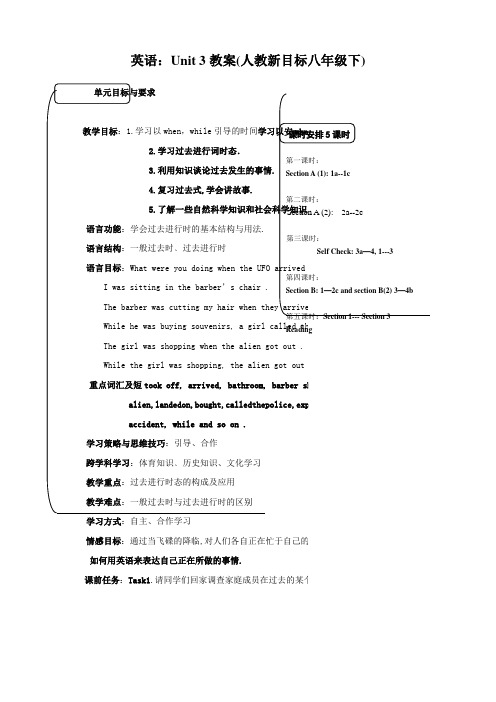
英语:Unit 3教案(人教新目标八年级下)学习方式:自主、合作学习情感目标:通过当飞碟的降临,对人们各自正在忙于自己的事如何用英语来表达自己正在所做的事情.课前任务:Task1.请同学们回家调查家庭成员在过去的某个时第一课时教学内容与分析教学内容:Section A (1): 1a---1c教学目标:1.能够掌握基本单词和词汇。
2.学会过去进行时的基本结构与用法。
3.能够运用以when 引导的时间状语从句。
4.能够运用基本句型进行提问。
学习任务:我的爱好目的:通过学生小组活动,调查在过去的不同时间里做不同的事情,学会使用过去进行时态,培养学生应用英语进行交际的能力。
语言技能:Listening .Speaking .Reading ﹑Writing语言知识:过去进行时的用法及复习一般过去时态提示词语及句型:got out, cut, barber shop, bathroom, kitchen, well, bathroomWhat were you doing when the UFO arrived ?I was sitting in the barber’s chair .The barber was cuttingmyhair when they arrived .教学重点、难点分析:教学重点:基本单词,词汇和句型教学难点:能够运用过去进行时谈论人们所做的事情.课前准备1.本课时的教学课件2.课前发给学生表格向学生布置任务:在表格中写出有关内容。
教学设计教学步骤建议和说明Teaching Steps :Step 1 :Warm-up and revision1.Share an English song .2.Greetings and free-talk .从平常的谈话中轻松导入本课句型,信息沟通使谈话非常真实,而又浅显What are you doing ? What did you do last night ?3.Show slides: Revise: is/an/are +动词ing4.Brain storm:Collect the names of activities which said by the students.Step 2 :Presentation :1.Watch a video2.By asking: What’s this in English ?Have you even seen it ?3.Teach:UFO, bedroom, bathroom, bedroom, kitchen,living-room, barber shopStep 3 :Work on:SB Page 18 , 1a .1.Point to the sentences .Read the sentences .Explain what each one means.2.Teach :barber shop, well, bathroom, bedroom, kitchen, get out, cut3.Look at the picture.. Point out the six people. Match the statements with the people in the picture4.Check the answers .5.Practice reading .Step 4 :Work on:SB Page 18 , 1b .1. Read the instructions .Make sure the Ss understand whatthey should do .2. Look at the dialogue in the picture .Explain :过去进行时态的构成: was / were + doing .用法:表示过去某一时刻或某一段时间正在进行的动作,一般用时间状语来表示。
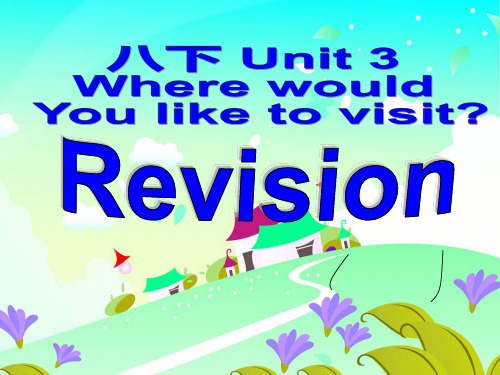
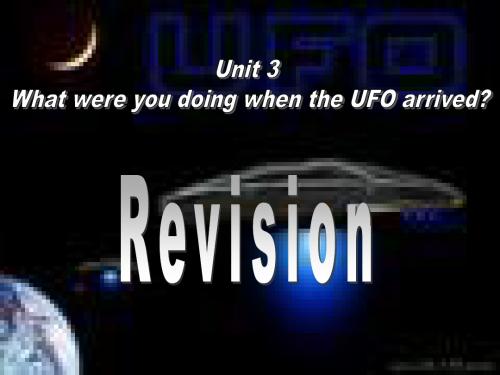
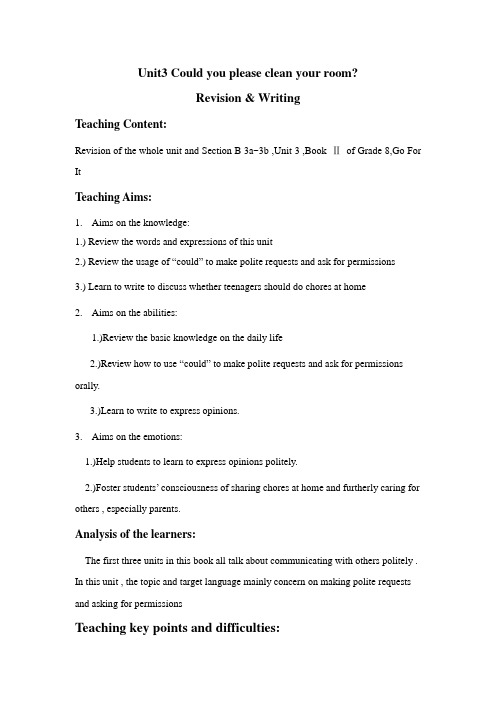
Unit3 Could you please clean your room?Revision & WritingTeaching Content:Revision of the whole unit and Section B 3a~3b ,Unit 3 ,Book Ⅱof Grade 8,Go For ItTeaching Aims:1.Aims on the knowledge:1.) Review the words and expressions of this unit2.) Review the usage of “could” to make polite requests and ask for permissions3.) Learn to write to discuss whether teenagers should do chores at home2.Aims on the abilities:1.)Review the basic knowledge on the daily life2.)Review how to use “could” to make polite requests and ask for permissions orally.3.)Learn to write to express opinions.3.Aims on the emotions:1.)Help students to learn to express opinions politely.2.)Foster students’ consciousness of sharing chores at home and furtherly caring for others , especially parents.Analysis of the learners:The first three units in this book all talk about communicating with others politely . In this unit , the topic and target language mainly concern on making polite requests and asking for permissionsTeaching key points and difficulties:The most difficult part of this passage is how to help students to talk and write about doing chores or not. Students need to use the polite language to communicate with others and try to understand the hard work of parents. It is a little bit difficult for students to express ideas in English , so it’s really important to teach and encourage students to use formal expressions and structures .Teaching Procedure:Design on the Blackboard:。
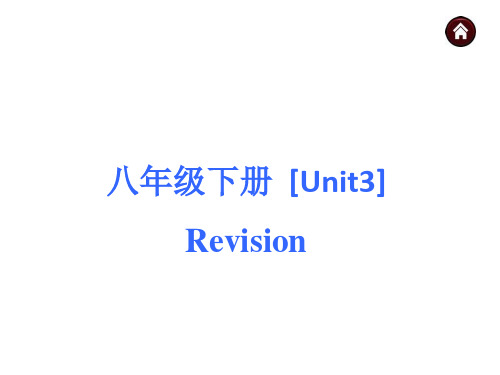
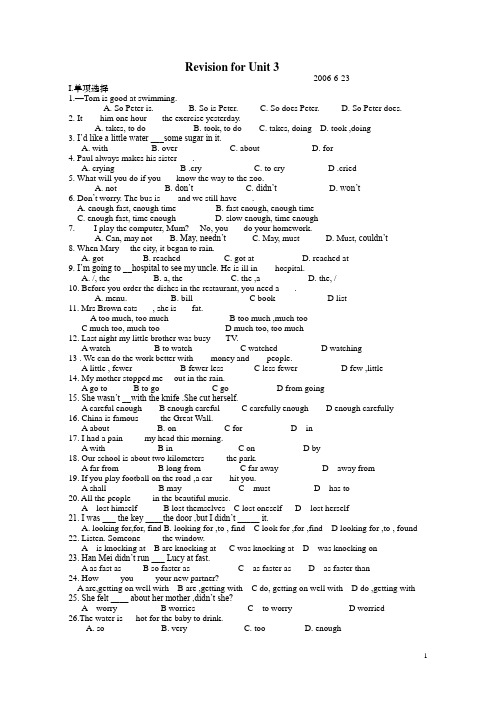
Revision for Unit 32006-6-23I.单项选择1.—Tom is good at swimming. ----_____A. So Peter is.B. So is Peter.C. So does Peter.D. So Peter does.2. It ___ him one hour ___the exercise yesterday.A. takes, to doB. took, to doC. takes, doingD. took ,doing3. I’d like a little water ___some sugar in it.A. withB. overC. aboutD. for4. Paul always makes his sister ___.A. crying B .cry C. to cry D .cried5. What will you do if you ___know the way to the zoo.A. notB. don’tC. didn’tD. won’t6. Don’t worry. The bus is ___ and we still have ___.A. enough fast, enough timeB. fast enough, enough timeC. enough fast, time enoughD. slow enough, time enough7.--___I play the computer, Mum? ---No, you ___do your homework.A. Can, may notB. May, needn’tC. May, mustD. Must, couldn’t8. When Mary __the city, it began to rain.A. gotB. reachedC. got atD. reached at9. I’m going to __hospital to see my uncle. He is ill in ___ hospital.A. /, theB. a, theC. the ,aD. the, /10. Before you order the dishes in the restaurant, you need a ___.A. menu.B. bill C book D list11. Mrs Brown eats ___, she is ___fat.A too much, too muchB too much ,much tooC much too, much tooD much too, too much12. Last night my little brother was busy ___TV.A watchB to watchC watchedD watching13 . We can do the work better with ___ money and ___ people.A little , fewerB fewer lessC less fewerD few ,little14. My mother stopped me __out in the rain.A go toB to goC goD from going15. She wasn’t __with the knife .She cut herself.A careful enoughB enough carefulC carefully enoughD enough carefully16. China is famous ____ the Great Wall.A about B. on C for D in17. I had a pain ____ my head this morning.A withB inC onD by18. Our school is about two kilometers ____ the park.A far fromB long fromC far awayD away from19. If you play football on the road ,a car ___ hit you.A shallB mayC mustD has to20. All the people ____ in the beautiful music.A lost himselfB lost themselvesC lost oneselfD lost herself21. I was ___ the key ____the door ,but I didn’t _____ it.A. looking for,for, findB. looking for ,to , find C look for ,for ,find D looking for ,to , found22. Listen. Someone ____ the window.A is knocking atB are knocking atC was knocking atD was knocking on23. Han Mei didn’t run ___ Lucy at fast.A as fast asB so faster asC as faster asD as faster than24. How ____ you ____ your new partner?A are,getting on well wirhB are ,getting withC do, getting on well withD do ,getting with25. She felt ____ about her mother ,didn’t she?A worryB worriesC to worryD worried26.The water is __ hot for the baby to drink.A. soB. veryC. tooD. enough27. You ____ a new pen because your old one is good enough.A. needn’tB. needn’t to buyC. don’t needD. don’t need buy28. ___ is very important to know sth about fire safety.A. ThatB. ThereC. ThisD. It29. Some dictions are in English and ___are in Chinese.A. otherB. othersC. the otherD. the others30. This shirt looks ____. The boy is looking at it ____.A. great, happyB. greatly, happilyC. great, happilyD. greatly, happy31. I bought a souvenir ___ my friend ___ the shopping mall.A. to, atB. for, fromC. to, fromD. for, to32. ___ does this coat cost?A. How manyB. How muchC. How much dollarsD. How many dollar33.--- I think it’s the most beautiful, but I won’t buy it. ----_________?A. WhyB. Why notC. WhatD. How34. This is a lion key ring. It’s not ___expensive.A. tooB. enoughC. too muchD. much35. Some books are large, thick and heavy, ___ are small, thin and light.A. OtherB. The otherC. The othersD. Others36.Dictionaries shouldn’t sit on the shelf. That doesn’t help _____.A. nobodyB. everybodyC. anybodyD. everyone37. --- Would you like ___ with me? ---- Yes, I’d love to.A. to go runningB. going shoppingC. to shoppingD. to go shopping38. --- Look at that coat. It’s pretty. ---- Yes, I like it ____.A. eitherB. neitherC. tooD. very much39.___ could you do without my help?A. WhyB. WhoC. WhatD. Where40.She’s got nothing to do, ______?A. is sheB. has sheC. isn’t sheD. does she41. He always has ___ to tell us.A. some good pieces of newsB. some pieces of good newsC. some good piece of newsD. some piece of good newsII.完形填空(A)A young man once asked Albert Einstein, the great German scientist, what the secret of success is. The scientist (1)______ him that the secret of success (2)______ hard work. (3)_______ a few days, the young man asked him the (4)______ question again. Einstein was very (5)______. He did not say (6)______, but wrote (7)______ words (8)_______ a piece of paper and handed it to the young man. The young man (9)_______ the piece of paper. On it was written: A=X+Y+Z."What does this mean?" asked the young man."A means success, " Explained the old scientist. "X means hard work, Y means good methods, and Z means stop (10)_______ and start to work."1. A. said B. asked C. told D. spoke2. A. is B. are C. were D. may be3. A. After B. Before C. For D. Since4. A. different B. same C. the same D. the different5. A. angry B. angrily C. happy D. happily6. A. something B. anything C. nothing D. something7. A. a few B. few C. a little D. little8. A. to B. at C. under D. on9. A. looked B. sees C. looked up D. looked at10.A. to talk B. talked C. talking D. talks(B)Before windows were used, old houses in Northern Europe and Britain (1)______ very dark. Their great rooms were high, with only (2)______ hole in the roof to let out the smoke fro(3)_______. As time went on, people began to make the holes bigger (4)______ as to have more light and air in their homes. The first English windows was just a small (5)_______ in the wall. It was out long, to letin (6)_______ possible, and narrow, to keep out the bad (7)_______. However, with the window out long, more wind than light would come in. This is (8)_______ it (9)_______ "the wind's eye" and " (10)_______".1. A. was B. were C. had D. are2. A. an B. the C. a D. /3. A. look fires B. cooking fire C. look fire D. cooking fires4. A. so B. than C. much D. very5. A. open B. opened C. opening D. to open6. A. as much lighter as B. so much as C. as lighter as D. as much light as7. A. whether B. weather C. sunny D. smell8. A. when B. why C. where D. what9. A. call B. called C. was called D. were called10.A. eye B. ear C. nose D. mouthIII. 阅读理解( A )For many people the subject of hiccups (嗝) is a joke, but for Harry Mendes, a fifteen-year-old schoolboy from Birmingham, it was something quite different.His hiccups began one Sunday lunchtime and continued day and night for two weeks. After the first week, Harry's parents took him to hospital, but it took another week for the doctors to cure his attack.Harry, who is now back at school, described what happened to him.“When I began to hiccup, I drank a glass of water but that didn't do any good. That evening I had hiccups every four seconds. We tried everything to stop them. I held my breath and drank cold drinks. My father even tried to give me a shock but that didn't work either.”After a week of sleepless nights, he went to hospital. The doctors took an X-ray of his chest but they couldn't find anything wrong.“They gave me some medicine and my hiccups slowed down, but it was another week before the medicine worked completely and my hiccups stopped.”Harry was very lucky. The world record holder is the American farmer Charles Osborne, who hiccupped for sixty-eight years. He stopped in 1990 at last, but nobody knows why.1.Harry's hiccups lasted ____.A. a weekB. fourteen daysC. twenty-eight daysD. one month2.His hiccups started after he ____.A. drank a glass of waterB. went to hospitalC. ate an Indian mealD. finished his homework3.His parents decided to take him to hospital when he ____.A. hiccupped for four secondsB. held his breathC. hiccupped at nightD. couldn't stop hiccupping4.His hiccups completely stopped one week after the doctor ____.A. gave him some medicineB. took an X-ray of his chestC. gave him a shockD. let him drink cold drinks5.What does “shock” in this passage mean?A. 震惊B. 休克C. 喷嚏D. 哈欠(B)Do you love the holidays, but hate the increase (增加) in weight (体重) that follows? You are not alone.Holidays are happy days with pleasure and delicious foods. But many people are worried about the weight that comes with these delicious foods.With proper (合适的) planning, it is possible to control your weight. The idea is to enjoy the holidays but not to eat too much. You don’t have to turn away from the foods that you enjoy. The following advice may be of some help to you.Do not miss meals. Before you leave home for a party, have a small, low-fat meal or fast food. This may help you to keep you from getting too excited before the delicious foods.Begin with clear soup and fruit or vegetables. A large glass of water before you eat may help you feel full. Use a small plate; a large plate may make you eat more than enough.Better not have high-fat foods. Choose lean (瘦的) meats. Fill your plate with salad and green vegetables.If you have a sweet tooth, try mints (薄荷) and fruits. They do not have fat like cream and chocolate.Don’t let exercise take a break during the holidays. A 20-minute walk after a meal can help you burn off excess calories (多余的热量).6.Holidays are happy days with pleasure but they may ______.A. bring weight problemsB. bring you much trouble in your lifeC. make you worried about your lifeD. make you hate delicious foods7 .Enjoy your holidays without putting on weight, and you’d better ______.A. drinking much water and have vegetables onlyB. not eat much food in high fatC. not take part in the partiesD. turn away from delicious foods8.According to the passage, ______ is a necessary part to stop you from putting in weight.A. vegetablesB. waterC. saladD. taking exercise9 .Many people can’t help putting on weight after the holidays because they ______.A. can’t control themselvesB. go to too many partiesC. enjoy delicious foodsD. can’t help turning away from the foods10..Excess calories can be found in your body in the form of (以……的形式) ________.A. energyB. fatC. foodD. water( C )Mr Ling lives in China. He worked in a factory and last year he retired(退休). His wife died five years ago and his son works in Japan. He always has sports and he is in good health.One day his son called him and asked him to have a journey to Tokyo. He was very happy. He was afraid to travel by plane and took the ship.On the first morning on the ship Mr Ling met an Englishman at table. The man said to him, “Good morning!”He thought the Englishman told his name to him. So he stood up and said, “Ling Bing!”And it was repeated a few mornings and Mr Ling told a teacher about it. Hearing him, the teacher began to laugh and said, “He says hello to you in the morning.”The next morning, when Mr Ling met the Englishman, he said, “Good morning!”And the Englishman stood up and said, “Ling Bing, sir.”11. What does Mr Ling do?A. A sports lover.B. A farmer.C. A worker.D. In good health.12. The old man stays at home ______________.A. with his wifeB. with his sonC. with his daughterD. by himself13. Mr Ling went to Japan by ship because ______________.A. he thought it was saferB. he wanted to have sports on the shipC. he had little money to take a planeD. he had enough time to do so14. The old man told his name to the Englishman because ________.A. he hoped to make friends with him.B. he wanted to say hello to him, too.C. he wanted him to teach him EnglishD. he thought “Good morning” was his name15. Which of the following is right?A. Mr Ling began to study English on the ship.B. The Englishman thought “Ling Bing” meant “Good morning” in ChineseC. The Englishman learned much Chinese on the ship.D. The old woman began to teach Mr Ling English.。
2019-2020年八年级英语下册《Unit 3 Revision》学案人教新目标版【励志小木屋】:Progress is the activity of today and the assurance of tomorrow .进步是今天的活动、明天的保证。
【学习目标】:(一)知识目标:1、Master words、phases and sentences.2、What were you doing when the UFO arrived? I was ………..(二)能力目标:掌握过去进行时的用法,并能运用过去进行时描述往事。
(三)情感目标:通过本单元学习,让学生在谈论过去的事情中获取成就。
【学习重难点】区分when and while.【Task 1】: 单词拼写1. I’d like to cut hair in that shop because the owner is a good _________(理发师).2. Where is my little cat? I can’t find her __________(任何地方).3. Don’t ________(喊叫) aloud in the library.4. Look! The monkey is __________(爬) up the tree.5. The plane _________(着陆) at 8:00a.m. yesterday.6. He is helping his mother in the ________(厨房).7. ---What __________(发生) t o the girl last night? ---She met an alien.8. He is going to have an __________(令人惊讶的) party next Sunday.9. ---Where is my brother? --- He is in the ___________(浴室).10. Don’t __________ (跳) down from the high walls.【Task2】根据句意,补全单词,使句子完整,首字母已给出1、Jim likes planes very much, so his father usually takes him to the Museum of F .2、When I saw an a __ come out of the UFO, I was too surprised.3、When he got home, his mother was busy cooking in the k __ .4、Tom had a very u _ experience yesterday. He saw a UFO.5、When the baby saw the snake, she wasn’t s __ at all.6、Linda was ill in h ___ last week, but now she is OK.7、If you visit a place, you should buy some s __ from the shop.8、I can’t find my pet cat a __ . I think she’s lost.9、While Linda was waiting for the train at the train s , I saw her.10、He wants to be a newspaper r in the future.【Task 3】单项选择1.This bag isn’t nice. Show me one, please!A.other B.another C.the other2. I was reading English the teacher came in.A.when B.while C.as soon as3. Mr Black is standing the classroom. He is teaching now.A.in front B.in the front of C.in front of4. They all got the classroom to play football.A .into B.out C.out of5. He stood up to see what outside.A.happen B.was happening C.was happened6. Jack when I saw him.A.was in the kitchen B.was cooking C.cooked D.A and B7. the girl was shopping, the alien got out.A.While B.When C.What D.A and B8. What he at 9:00 yesterday morning?A.did; do B.was; do C.was; doing9. We had great fun to our MP3.A.listen B.to listen C.listens D.listening10. I followed the alien where it was going.A.to see B.saw C.see D. seeing【复习诊断】短文填空healthy on dangerous seat careful good buy ride shop leaveTwo years ago my husband ____ a bike for me. If you live in a town, it is often faster t han a car and don’t have to worry about parking(停车). You can __ it anywhere. Because it has a ___ at the back and a basket at the front, I can take my sm all daughter when it is cold and it is snowing hard. It also can be ____ . You must be _____ on a bike. Accidents are not the only problem. One day I went ______ and when I came back, I couldn’t find my front wheel (轮子). It was a long walk to the bike shop! Now I have three strong locks. Sometimes my husband uses my bike for short trips. He is not good at ____ bikes, but he says it is _______ thanwaiting for a bus. He still likes his car for longer trips, but I think that all this sitting is making him fat. ______ my bike I got a lot of exercise and fresh air, and makes me feel much ______ .【限时作业】满分10分得分__________1、Go and wash your hands in the b __ .2、He had m any exciting e __ while traveling in China.3、We have to s because the music was so loud.4、There was a traffic a here. Luckily, nobody was injured.5、The boy went into the classroom in s because others are having a lesson.6、The thief __ _ (逃跑)last weekend. He hasn’t been caught by now.7、She didn’t __ __ (想到)looking outside the station.8、He likes his mother __ (跟着…做…)go shopping on weekends.9、Dave doesn’t feel well. He was ___ (在诊所里).10、The plane that Tome took (起飞)just now.Homework1、The man was reading newspapers when I came in.(就划线部分提问)the man when you came in?2、My mother was cooking when I got home yesterday.(改为一般疑问句,并作肯定回答)your mother when you got home yesterday? Yes, she .3、The alien visited the Museum.(就划线部分提问) the alien ?4、Davy jumped and ran with another dog yesterday.(加上at 4:30 改写)Davy and with another dog at 4:30 yesterday.书面表达(15分)上周日Peter和朋友在公园渡过了一个愉快的周末,请根据下列括号内所给的提示词,发挥你的想像力写一篇60字左右的短文。
Unit3 Grade8What were you doingwhen the UFO arrived?Section A Period 1have a partydanceplay soccer do some readingplay tennisRevision :boat on the sea—What is he doing?—He is play ing tennis.—What are they doing ? —They are boa ting on the sea.What is the boydoing ?He is sleeping.What was he doing at 9yesterday evening? He was doing his homeworkHewas playing football.What was the boy doing just now ?What is the boy doing now ?He is playing football.What are you doing now?What were you doing atthis time yesterday?We are having a class.We were having a class at this time yesterday.过去进行时含义:表示过去某个时刻正在进行的动作。
结构:was/were + doing例句:I was having an English class at this time yesterday .现在进行时含义:表示现在正在进行的动作。
结构:is/am/are + doing例句:I am having an English class.A:What were they do ing yesterday afternoon?B:They were…Look and learn: 学习新词汇bedroom 卧室kitchen 厨房bathroom 浴室barber shop 理发店UFO(UnidentifiedFlying Objects).不明飞行物;飞碟alien 外星人;从另一个世界来的生物bedroom ['bedrum]卧室kitchen['kitʃin]厨房bathroom['ba:θrum]浴室barber['bɑ:bə]shop 理发店UFO 不明飞行物;飞碟alien['eiliən]外星人;从另一个世界来的生物get out 出去;离开bought[bɔ:t]动词buy的过去式land[lænd]着陆got[gɔt]动词get的过去式take off 起飞while[wail]当……的时候Do you know?UFO:Unidentified Flying Object不明飞行物•1947年6月24日,一名叫做阿诺德的美国商人,架着一架小型飞机在华盛顿州上空,发现一组巨型不明飞行物以1000公里左右的速度,同他一起在空中翱翔。
新版新目标英语八年级下册unit3知识点总结New Target English Grade 8 Unit 3In Unit 3 of the New Target English Grade 8 textbook, students are introduced to various key concepts and topics. This unit focuses on the theme of "Community Service," highlighting the importance of giving back to society and making a positive impact. Throughout this unit, students learn about vocabulary, grammar, and reading comprehension related to community service. Let's delve into the key points covered in Unit 3.1. Vocabulary and PhrasesUnit 3 expands students' vocabulary related to community service. Key terms include volunteering, charity, donate, fundraising, organization, orphanage, homeless shelter, and environmental protection. Students learn these words and phrases through various exercises, such as matching exercises, fill-in-the-blanks, and sentence completion. It is important for students to understand and use this vocabulary accurately in order to express their ideas effectively.2. GrammarThe grammar focus in Unit 3 revolves around the use of modal verbs. Students learn how to use modal verbs like can, could, may, might, should, and must to express possibility, permission, advice, and obligation. Through grammar exercises and contextualized examples, students practice forming sentences using these modal verbs correctly. Understanding and using modalverbs will help students express their opinions and make suggestions regarding community service activities.3. Reading ComprehensionReading comprehension plays a crucial role in Unit 3. Students engage with various texts that provide information and inspiration about community service. These texts include articles, interviews, and personal narratives. By reading these texts, students gain a deeper understanding of different community service projects, the experiences of volunteers, and the impact of community service on society. Comprehension questions and activities related to the texts help students enhance their reading skills and develop critical thinking.4. Writing SkillsUnit 3 also focuses on developing students' writing skills related to community service. Students learn how to write emails, letters, and paragraphs to express their opinions, give suggestions, and describe their own experiences with community service. Through guided writing exercises, students learn how to structure their writing, organize their ideas logically, and use appropriate language and grammar to effectively communicate their thoughts.5. Listening SkillsListening activities in Unit 3 revolve around community service topics. Students listen to dialogues, interviews, and speeches related to community service. These listening exercises help improve their listening comprehension skills, while also providing exposure to different accents andspeaking styles. By actively listening and answering comprehension questions, students practice their listening skills and develop their ability to extract essential information.6. Speaking PracticeSpeaking activities in Unit 3 aim to encourage students to actively participate in classroom discussions about community service. Students engage in pair work, group work, and class discussions to exchange ideas, share personal experiences, and express their opinions about community service activities and their significance. These speaking activities help students develop their oral communication skills, build confidence, and learn how to express themselves fluently and accurately.In conclusion, Unit 3 of the New Target English Grade 8 textbook provides comprehensive knowledge and skills related to community service. Through vocabulary, grammar, reading comprehension, writing, listening, and speaking activities, students have the opportunity to engage with the topic and develop a deeper understanding of the importance of community service in society. By actively participating in the various exercises and activities, students can further develop their language proficiency and communication skills while also cultivating a sense of social responsibility.。
2021人教新目标英语八下unit3《Couldyoupleasecleanyourroom》教案教学目标:1语言目标:谈论做家务的词汇,及如何有礼貌的提出要求。
2 技能目标:能听明白和谈论做家务的话题;能写出重点单词和重点句型。
3 情感目标:培养学生爱劳动,分享家务的能力。
教学重点短语: do the dishes, make the bed, take out the rubbish, fold the clothes, sweep the floor, clean the living room ……句子:1. Could you please take out the rubbish?. Sure. / Sorry, I can’t. I have to finish homework first.2. Could I use your computer?Sorry. I'm going to work on it now.3. Well, could I watch TV?Yes, you can. But first you have to clean your room.教学难点:Make polite requestsAsk for permission课时划分:Period 1 Section A 1a – 2dPeriod 2 Section A 3a-3cPeriod 3 Section A Grammar focus-4cPeriod 4 Section B 1a-2ePeriod 5 Section B 3a-self checkSection A1 (1a – 2d)Step 1 Warming-upSing the song and dance to the musicStep 2 Presentation1. W atch the photos and talk about them “W hat does he do every day?’and learnthese phrases: do chores, do the dishes, make the bed, take out the rubbish, fold the clothes, do the laundry, clean the living room.2. Look these phrases and practice the conversation: Could you please takeout the rubbish? Sure. / Sorry, I can’t. I have to finish homework first.3. 1a Do you do these chores at home? Discuss them with your partner.Step 3 Listening1b Listen. Who will do these chores? Check (√) Peter’s mother or Peter.Step 4 Practice1c Make conversations about the chores in 1a.Make conversations.ExamplesA: Could you please...?B: Yes, sure. /All right. /No problem./Certainly.Sorry, I can't. I have to do...Sorry, I can't. I am doing...Step 5 Listening 2a&2bPeter asks his father if he can do four things. What does his father say? Check (√) “yes” or “no”. Listen again. Draw lines to the reasons.Step 6 Practice2c Make conversations using the information in 2a and 2bA: Could I use your computer?B: Sorry. I’m going to work on it now.A: Well, could I watch TV?B: Yes, you can. But first you have to clean your room?2d Role –play the conversationStep 7 Language points and summary1. help out 动词短语,表示在某人繁忙或遇到困难时“给予关心”。